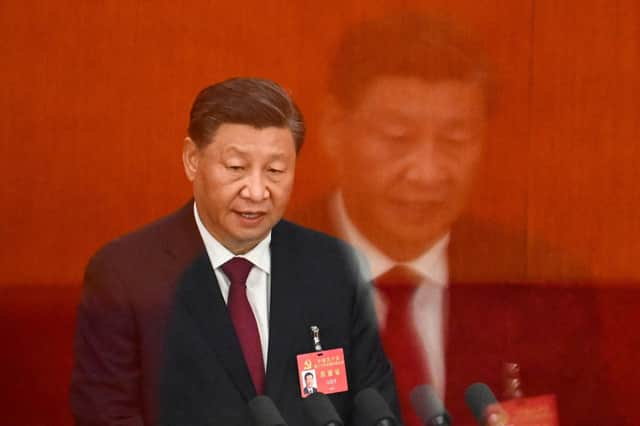China’s President Xi Jinping calls for military growth amid tension with US


China’s most influential figure in decades spoke as the party opened a congress that is being closely watched by companies, governments and the Chinese public for signs of its economic and political direction.
It comes amid a painful economic slump and tension with Washington and Asian neighbours over trade, technology and security.
The congress will install leaders for the next five years.
Advertisement
Hide AdAdvertisement
Hide AdMr Xi is expected to break with tradition and award himself a third five-year term as the party’s general secretary, entrenching his vision of reasserting its dominance in the economy, society and culture following four decades of market-style liberalisation.
The 69-year-old called for accelerating military and technology development to propel the “rejuvenation of the Chinese nation” in a televised speech of one hour and 45 minutes to some 2,000 delegates in the cavernous Great Hall of the People.
The party’s military wing, the People’s Liberation Army, needs to “safeguard China’s dignity and core interests”, the president said, referring to a list of territorial claims and other issues over which Beijing says it is ready to go to war.
The PLA is the world’s second-largest military after the United States and is trying to extend its reach by developing ballistic missiles.
“We will work faster to modernise military theory, personnel and weapons,” Mr Xi said in the speech, which was punctuated by brief bursts of applause from the masked delegates. “We will enhance the military’s strategic capabilities.”
He cited his government’s severe “zero-Covid” strategy, which has shut down major cities and disrupted travel and business, as a success. He gave no indication of a possible change despite public frustration with its rising cost.
Analysts are watching whether a slump that saw economic growth fall to below half of the official 5.5% annual target might force him to compromise and promote supporters of market-style reform and entrepreneurs who generate wealth and jobs.
On Sunday Mr Xi gave no indication whether he would pursue a third term as leader or when he might step down.
Advertisement
Hide AdAdvertisement
Hide AdDuring his decade in power, his government has pursued an increasingly assertive foreign policy while tightening control at home on information and dissent.
Beijing is feuding with Japan, India and Southeast Asian governments over conflicting claims to the South China and East China Seas and a section of the Himalayas. The United States, Japan, Australia and India formed a strategic group dubbed the Quad in response.
The party has increased the dominance of state-owned industry and poured money into strategic initiatives aimed at nurturing Chinese creators of renewable energy, electric car, computer chip, aerospace and other technologies.
Its tactics have prompted complaints that Beijing improperly protects and subsidises its fledgling creators and led then-president Donald Trump to increase tariffs on Chinese imports in 2019, setting off a trade war that jolted the global economy.
Mr Trump’s successor, Joe Biden, has kept those penalties in place and this month increased restrictions on Chinese access to US chip technology.